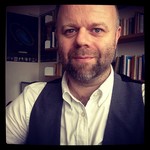Fear of Faith?
The return of religion to the arts, and the return of Soul City Arts to Australia
Recently Mohammed Ali has been getting back to his artistic roots. He created a live painting in the performative style he first developed over a decade ago, drawing in contributions by musicians and poets. This time he was working at the iconic Wembley Stadium in London and, as his words and images show, it was all about illuminating the role faith can play in defining and driving the aspirations of sportsmen and women today.

In fact, the project ties in with a whole string of recent work by Ali and the company he founded, Soul City Arts, which criss-crosses various formats, media, venues and audiences. The Wembley painting follows hot on the heels of ‘Ramadan Streets’, which was a completely different affair and on a completely different scale. Held over ten nights during the holy month, Ali and collaborators worked to curate a night market involving food, crafts, and entertainment for Birmingham’s public.
In recent years, Ramadan has become an increasingly public festival in the West. Impromptu street markets now fill our city streets, bringing fun, colour and a certain measure of chaos to our communities. Ali’s job, part commission, part self-appointed task, was to deliver a safe, organised, and focussed version of one such market, to make the experience manageable, sustainable, but also to keep it real, authentic, and not to suck the soul out of a flowering of urban Muslim culture. In the event, people came and loved what they saw. In fact, there were around 30,000 of them.
.jpg)
Both these recent SCA projects, painting and night market, reflect a common, core endeavour – to place Islamic values and traditions on show within the public gaze and to represent Muslims living their faith in a positive, but also unapologetic way. And it’s this open, yet unapologetic stance that marks out how faith informs SCA’s work. They will assure you that their art isn’t threateningly Islamic. They don’t want to preach, to convert, to take over, to force values and beliefs down the throats of others, or even to be militant and aggressive. They don’t want to do any of the things the reactionary politicians, jingoists, and the right-wing media would have you believe. Yet neither will they hide away their faces, nor dilute nor compromise on their values and traditions. In fact, they want to show you that it is precisely those Islamic traditions which compel them to show kindness, charity, and hospitality, and also to stand for social and political justice. And people need not be afraid of what they stand for: many non-Muslims work regularly with SCA, finding common cause.
My own connection to SCA, which now stretches back now over years, pivots around this set of values. As a cultural historian and literary scholar, I have been studying the way in which Western culture and society have all too often sought to air-brush Islam, to sanitise and normalise Islam, to domesticate it and make it palatable precisely in the moment it seeks to connect with, embrace and include it: in other words, Muslims belong, as long as they are the right kind of Muslims. Yet, who gets to decide who that is and what that means? Studying this history reminds us to pose precisely that question, to ask what real diversity is, whom the tick-box ‘inclusivity’ agendas of today are seeking to include – and at what ‘cost’ and with what ‘losses’ so-called inclusivity policies operate.
Currently writing from my base in Naarm/ Melbourne, it’s great to know that Ali and SCA will be returning to Australia later in July 2025 with their ‘Fear of Faith’ project. It’s not the first time he has been here, having worked in the past with a range of local artists, arts organisations, and communities. But this visit marks the beginning of a new phase in SCA’s Australian legacy. We’ll be able to reveal more about the programme soon. One thing remains sure, though: as they invite audiences in, asking them to engage and collaborate, they will also ask them to let go of any lingering fear they might have. To overcome the fear of faith which so many of us, if we are honest, still carry with us.
a UK academic exploring Islam through global history and culture.
